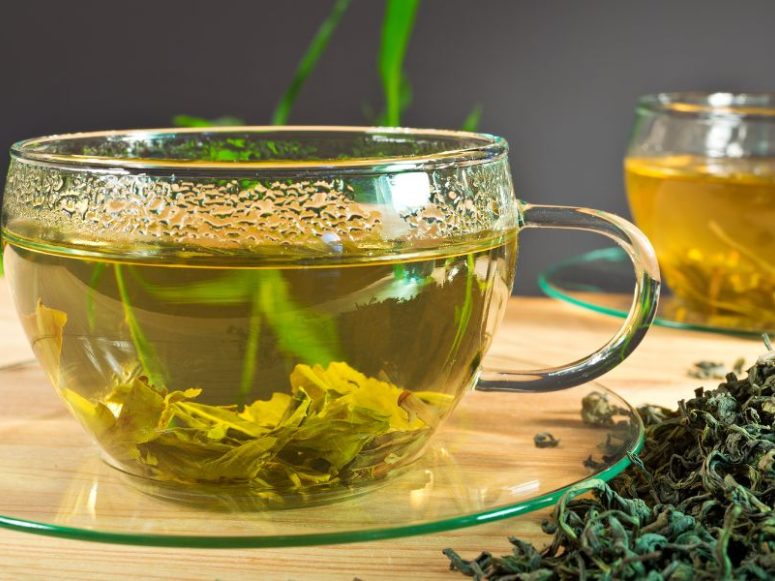Key Points
- Green tea may support modest weight loss by boosting metabolism, enhancing fat burning, and gently curbing appetite—thanks to EGCG and caffeine.
- It’s most effective as a complement to healthy habits like regular exercise and a balanced diet—not as a standalone solution.
- Research is promising but mixed; while some studies show benefit, results vary, and green tea should be seen as a supportive wellness aid.
Green tea has been cherished for centuries, but its rising star in the weight loss arena has brewed up quite a storm of interest. It's not just a flavorful cup of warmth—some suggest it could be a ticket to shedding those extra pounds.
But how does this beloved elixir fit into the puzzle of weight management?
Does it truly hold the secret to helping us achieve our weight loss goals, or is it simply a refreshing beverage with a hint of promise?
In this blog post, we’ll delve into the scientific properties of green tea, explore the mechanisms that might support weight loss, and discuss how it could complement a holistic approach to health. We'll also consider its place alongside conventional methods.
So, pour yourself a cup of this gentle brew, settle in, and discover if green tea could be the companion you’ve been seeking on your journey to a healthier, happier you. Whether you've been sipping it for years or just heard the buzz, there's plenty to uncover about this verdant delight!
What’s in Green Tea?
Green tea, though humble in appearance, is quite the powerhouse when it comes to its health-boosting components. Let’s take a closer look at what makes this fragrant brew so special.
One of its key active compounds is catechins, a type of antioxidant with a mighty reputation. Among these catechins, epigallocatechin gallate (EGCG) stands out for its potential weight loss benefits. Research suggests that EGCG might help by boosting metabolism and burning fat, giving your body a natural nudge in the right direction.
Don’t forget about caffeine, which is also present in green tea, albeit in modest amounts compared to coffee. This gentle caffeine kick can contribute to enhanced metabolism and increased energy expenditure, which could support weight loss efforts when combined with a healthy lifestyle.
Then there's the antioxidant prowess of green tea. Antioxidants are like tiny warriors battling oxidative stress in the body, which might otherwise lead to chronic diseases. These compounds help maintain cellular health and can complement your weight loss journey by promoting overall well-being.
Overall, the components in green tea create a well-rounded profile that supports many aspects of health. Of course, there’s no magic bullet, but including green tea in your routine can be a flavorful and beneficial choice.
How Green Tea Might Support Weight Loss
When it comes to weight loss, green tea could offer a multi-faceted approach.
First up, boosting metabolism. The combination of caffeine and EGCG is thought to enhance your metabolic rate by making your body burn calories more efficiently. This could mean that your body is working a bit harder, even when you're at rest.
Caffeine is like your body's personal trainer, giving your metabolism a gentle nudge. Meanwhile, EGCG has been researched for its potential synergy with caffeine, suggesting that together they're a dynamic duo in the weight loss department.
Another exciting potential of green tea is fat oxidation. Research indicates that the compounds in green tea may increase the rate at which your body burns fat, particularly during exercise and even while you're lounging around afterwards.
Let’s also touch on appetite regulation. Some studies suggest that green tea could have a subtle influence on hunger hormones, leading to feelings of satiety. This means you might feel fuller for longer, possibly consuming fewer calories throughout the day.
Green tea may not be a miracle in a cup, but it certainly has attributes that could complement a balanced diet and active lifestyle, making it a potentially valuable tool in your weight loss toolkit.
What the Research Says
When it comes to green tea and weight loss, scientific studies offer some intriguing insights.
Clinical studies and meta-analyses have examined the weight loss effects of green tea, with many highlighting its potential benefits. Some research suggests that green tea can contribute to modest weight loss, particularly when the catechins and caffeine it contains join forces. These compounds are said to potentially enhance fat burning and increase metabolic rate.
Regarding effective dosages, the forms of green tea matter. Traditional brewed green tea offers a natural and enjoyable way to incorporate these compounds into your diet. However, green tea extracts, with their concentrated doses of catechins, are also a popular choice and might provide a more targeted approach for some individuals.
It’s essential to note the limitations of current research. While many studies indicate positive outcomes, results can vary due to differences in study design, populations, and dosages used. Additionally, most studies suggest that the weight loss effects are relatively modest and are best seen as a part of a comprehensive weight management plan.
Remember, green tea can support your wellness journey, but it's not a standalone solution—it's most effective when paired with a balanced diet and regular exercise.
Green Tea vs. Other Weight Loss Aids
When you step into the world of weight loss aids, you’ll quickly realize there's a spectrum of options, each with its own buzz.
Green tea often gets comparisons to coffee, another beloved beverage with a kick. While both contain caffeine, green tea brings EGCG to the party, adding a unique dimension. Coffee might offer more of an immediate energy boost due to its higher caffeine content, but green tea provides a more balanced approach with its mix of compounds.
Then there’s Garcinia cambogia, a popular supplement known for its hydroxycitric acid, which some claim may help curb appetite and impede fat production. However, its effectiveness is still up for debate, and research findings are mixed.
When considering safety and effectiveness, green tea tends to be a gentle option, especially when consumed as a brewed beverage. Its side effects are minimal, making it a safer bet compared to some supplement-based aids, which might come with unwanted side effects.
Ultimately, while green tea is not a miracle cure, it stands out for its holistic support and relative safety, making it a knowledgeable choice for those looking to complement a balanced lifestyle.
How to Incorporate Green Tea into a Healthy Lifestyle
Incorporating green tea into your daily routine can be both simple and enjoyable. Let's explore the best ways to make it a part of your healthy lifestyle.
When it comes to enjoying green tea, timing and frequency can make a difference. Aim to consume one to three cups a day for a balanced approach. Morning or early afternoon may be ideal times, providing a gentle energy boost without disrupting your sleep later on. Experiment with different types, from matcha to traditional brewed varieties, to find your favorite.
To keep your green tea experience as beneficial as possible, avoid sweeteners and creamers that can sneak in extra calories. Instead, savor the natural flavors or try adding a slice of lemon or a few mint leaves for a refreshing twist.
While green tea can be a supportive ally in your weight loss journey, it’s most effective when combined with a balanced diet and regular exercise. Focus on whole, nutrient-dense foods and stay physically active to create the best environment for sustainable weight management.
By treating green tea as a complement to a healthy lifestyle, you can enjoy its potential benefits without losing sight of the bigger picture.
Potential Side Effects and Considerations
While green tea is generally safe for most people, there are some potential side effects and considerations to keep in mind before you start sipping away.
If you’re sensitive to caffeine, even the moderate amount in green tea can cause jitters, anxiety, or disrupt your sleep. It's a good idea to monitor how your body responds and adjust your intake accordingly.
High-dose green tea extracts, often found in supplements, can pose a risk to the liver. Some cases of liver damage have been reported, particularly when consuming large amounts. It’s crucial to use these products cautiously and consult with a healthcare provider if you have any concerns.
Finally, green tea can interact with certain medications. For example, it might affect blood thinning medications due to its vitamin K content or alter how your body absorbs other drugs. Always check with your healthcare provider before making significant changes to your green tea consumption, especially if you’re on medication.
Embracing green tea as part of your wellness routine can be a delightful journey, but staying informed and mindful ensures it remains a positive addition.
Conclusion
As we steep through the findings, it’s clear that green tea offers a blend of potential benefits, from boosting metabolism and aiding fat oxidation to providing a gentle, energizing touch. However, it's important to approach green tea as a supportive tool, rather than a miracle weight loss solution.
While the compounds in green tea, such as EGCG and caffeine, can complement your weight management efforts, they are most effective when paired with healthy lifestyle habits. Focusing on a balanced diet and regular exercise should always be the cornerstone of any weight loss journey.
Remember, sustainable lifestyle changes, not quick fixes, pave the way to long-term health. Embrace the process, and consider green tea as a delightful addition to your routine, supporting your wellness journey in a refined, natural way.
If you're curious about how best to tailor your weight loss approach, or if you have questions about integrating green tea into your plan, don’t hesitate to reach out. Book an appointment with our primary care providers at SOM Medical Practice. We’re here to help guide you toward optimal health and well-being, one step—and one cup—at a time.










